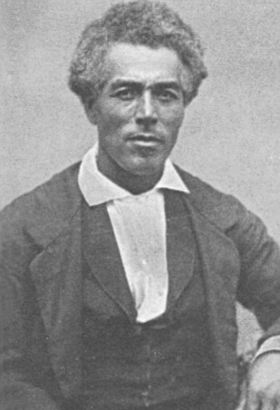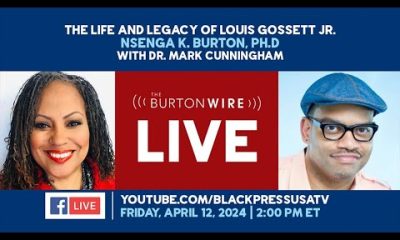Black History
Horace King: A Genius Builder and Architect in Old South
One of the greatest fears of a slave owner was Black literacy. An uneducated slave was thought to be nonthreatening and “necessary to their security.”

One of the greatest fears of a slave owner was Black literacy. An uneducated slave was thought to be nonthreatening and “necessary to their security.”
Reading and writing posed a threat to the system of slavery, and strict laws were enforced against it. Simply put: educating an enslaved person was a crime. John Godwin, however, ignored this law, giving his slaves, including Horace King (1807–1885), a great degree of freedom.
King was born in South Carolina. He was taught to read early and thought to have been literate when purchased by Godwin around 1830. Soon after, Godwin, a builder, relocated from Alabama to a suburb of Columbus, Ga. There, he was awarded the contract to build the first public bridge connecting the two states.
It is said that King planned the project and supervised the enslaved people tasked to erect the span. It was then that Godwin realized King’s talents and natural genius as a builder. He made the decision to take King on as his protégé. Soon after, he sent King to Oberlin College (Ohio), the first college to admit African-American students.
After graduation, King returned to work with Godwin. The two collaborated on the construction of courthouses and bridges throughout Georgia and Alabama. In 1841, they rebuilt their Columbus City Bridge which had been destroyed in a flood.
King also served as superintendent and architect of major bridges at Wetumpka, Ala., and Columbus, Miss. Godwin did not supervise those projects.
Godwin experienced financial difficulties in the late 1830s, forcing him to transfer ownership of King to his wife and her uncle. In 1846, King was freed. It is said that Godwin came to these decisions because he needed to “protect this valuable asset (King) from his creditors.”
King could possibly have bought his freedom, but the relationship between the two men continued.
In the mid-1850s, King erected Moore’s Bridge, which stretched over the Chattahoochee River between Newnan and Carrollton. In lieu of cash, he accepted stock in the enterprise as payment. King’s wife and their five children are believed to have moved to this site. There they tended the bridge and farmed until 1864, when the Union cavalry burned the span.
The Civil War (1861–65) brought an economic boom to Columbus. King, at that time, worked for the Confederacy, supplying timber. He also took on the project of erecting a major building for the Confederate navy.
During Reconstruction (1863–77), King became a Republican politician. He served two terms as a member of the Alabama House of Representatives, although his presence was minimal. His focus was on rebuilding wagon and railroad bridges, grist and textile mills, cotton warehouses, and public buildings. He did not seek a third term.
In 1872, King and his family moved to LaGrange, Ga., where he continued to design and construct bridges, stores, houses, and college buildings. He had become the most respected bridge builder in west Georgia, Alabama, and northeast Mississippi from the 1830s until the 1880s. King died in 1885.
Activism
S.F. Black Leaders Rally to Protest, Discuss ‘Epidemic’ of Racial Slurs Against Black Students in SF Public School System
Parents at the meeting spoke of their children as no longer feeling safe in school because of bullying and discrimination. Parents also said that reported incidents such as racial slurs and intimidation are not dealt with to their satisfaction and feel ignored.

By Carla Thomas
San Francisco’s Third Baptist Church hosted a rally and meeting Sunday to discuss hatred toward African American students of the San Francisco Unified School District (SFUSD).
Rev. Amos C. Brown, president of the San Francisco NAACP and pastor of Third Baptist Church, along with leadership from local civil rights groups, the city’s faith-based community and Black community leadership convened at the church.
“There has been an epidemic of racial slurs and mistreatment of Black children in our public schools in the city,” said Brown. “This will not be tolerated.”
According to civil rights advocate Mattie Scott, students from elementary to high school have reported an extraordinary amount of racial slurs directed at them.
“There is a surge of overt racism in the schools, and our children should not be subjected to this,” said Scott. “Students are in school to learn, develop, and grow, not be hated on,” said Scott. “The parents of the children feel they have not received the support necessary to protect their children.”
Attendees were briefed last Friday in a meeting with SFUSD Superintendent Dr. Matt Wayne.
SFUSD states that their policies protect children and they are not at liberty to publicly discuss the issues to protect the children’s privacy.
Parents at the meeting spoke of their children as no longer feeling safe in school because of bullying and discrimination. Parents also said that reported incidents such as racial slurs and intimidation are not dealt with to their satisfaction and feel ignored.
Some parents said they have removed their students from school while other parents and community leaders called on the removal of the SFUSD superintendent, the firing of certain school principals and the need for more supportive school board members.
Community advocates discussed boycotting the schools and creating Freedom Schools led by Black leaders and educators, reassuring parents that their child’s wellbeing and education are the highest priority and youth are not to be disrupted by racism or policies that don’t support them.
Virginia Marshall, chair of the San Francisco NAACP’s education committee, offered encouragement to the parents and students in attendance while also announcing an upcoming May 14 school board meeting to demand accountability over their mistreatment.
“I’m urging anyone that cares about our students to pack the May 14 school board meeting,” said Marshall.
This resource was supported in whole or in part by funding provided by the State of California, administered by the California State Library via California Black Media as part of the Stop the Hate Program. The program is supported by partnership with California Department of Social Services and the California Commission on Asian and Pacific Islander American Affairs as part of the Stop the Hate program. To report a hate incident or hate crime and get support, go to CA vs Hate.
Activism
Oakland Post: Week of May 1 – 7, 2024
The printed Weekly Edition of the Oakland Post: Week of May 1 – 7, 2024

To enlarge your view of this issue, use the slider, magnifying glass icon or full page icon in the lower right corner of the browser window. ![]()
Activism
Oakland Post: Week of April 24 – 30, 2024
The printed Weekly Edition of the Oakland Post: Week of April 24 – 30, 2024

To enlarge your view of this issue, use the slider, magnifying glass icon or full page icon in the lower right corner of the browser window. ![]()
-

 Community3 weeks ago
Community3 weeks agoFinancial Assistance Bill for Descendants of Enslaved Persons to Help Them Purchase, Own, or Maintain a Home
-

 Business3 weeks ago
Business3 weeks agoV.P. Kamala Harris: Americans With Criminal Records Will Soon Be Eligible for SBA Loans
-

 Activism4 weeks ago
Activism4 weeks agoOakland Post: Week of April 10 – 16, 2024
-

 Community3 weeks ago
Community3 weeks agoAG Bonta Says Oakland School Leaders Should Comply with State Laws to Avoid ‘Disparate Harm’ When Closing or Merging Schools
-

 Activism2 weeks ago
Activism2 weeks agoOakland Post: Week of April 24 – 30, 2024
-

 Community2 weeks ago
Community2 weeks agoRichmond Nonprofit Helps Ex-Felons Get Back on Their Feet
-

 City Government3 days ago
City Government3 days agoCourt Throws Out Law That Allowed Californians to Build Duplexes, Triplexes and RDUs on Their Properties
-

 Community2 weeks ago
Community2 weeks agoOakland WNBA Player to be Inducted Into Hall of Fame





















































